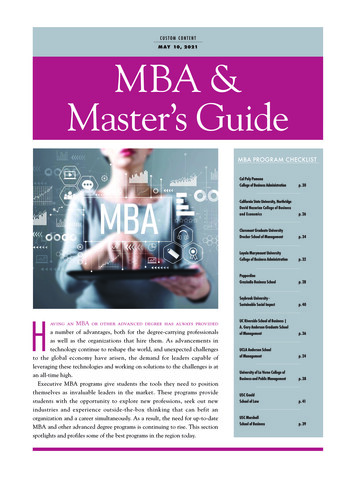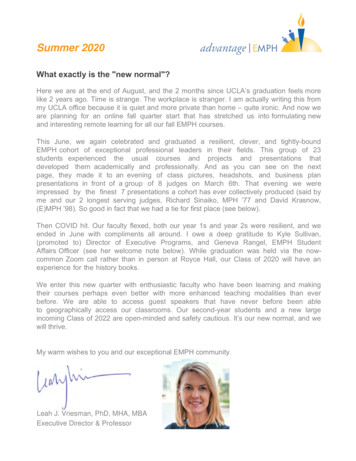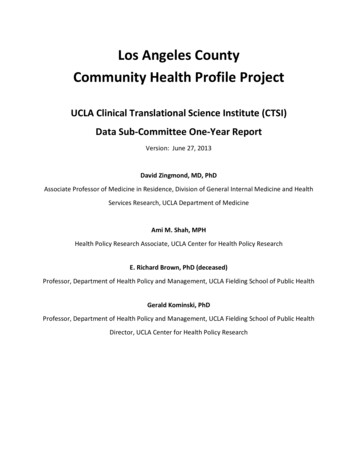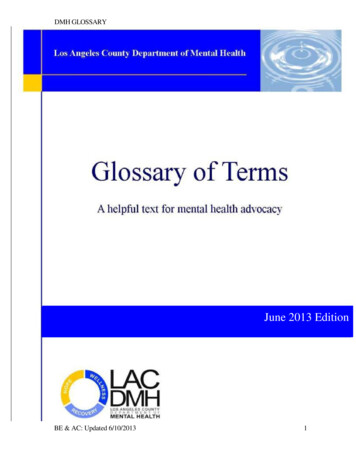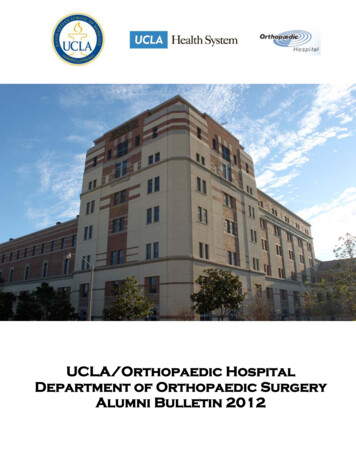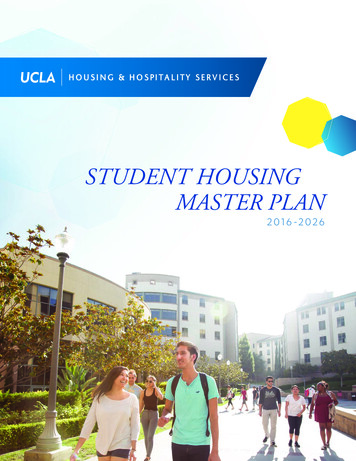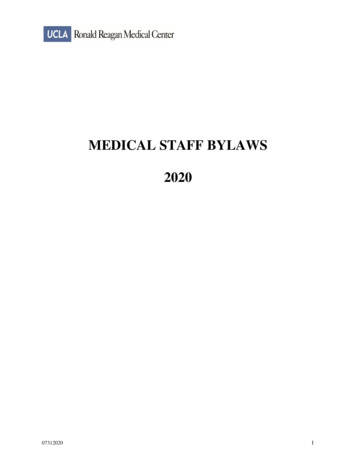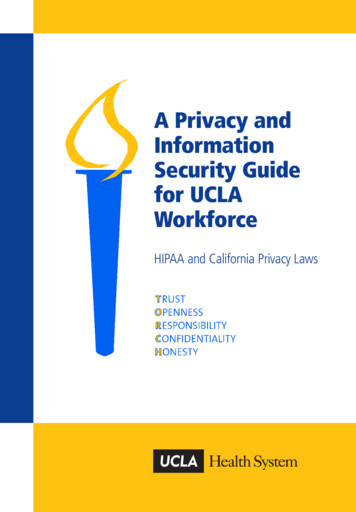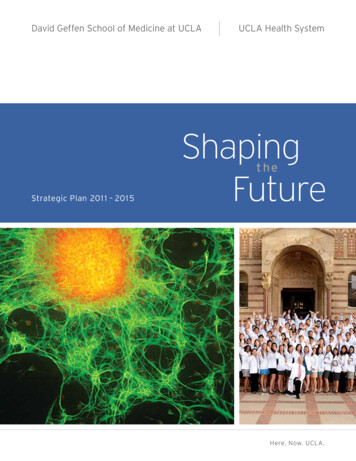
Transcription
David Geffen School of Medicine at UCLAUCLA Health SystemShapingFuturet heStrategic Plan 201 1 – 201 5Here. Now. UCLA.
Contents1Letter from Vice Chancellor and Dean2Overview3Mission and Values4Education6Research8Community Engagement10Clinical Care12Steering Committee13Design Teams
“ Shaping the future requiresvivid imagination and gifted people.”Shaping the future requires vivid imagination and gifted people. Fortunately, UCLA Health Sciences isrichly endowed with both. And we have tapped this resource to create the new Strategic Plan for theDavid Geffen School of Medicine at UCLA and the UCLA Health System.The Plan articulates our aspirations and the strategic priorities we will pursue to achieve our goals. Itdelineates the investments we must make to sustain a thriving community of the best and brightest faculty,staff and trainees. It describes the environment we must nurture to support our people in achieving their ownindividual goals, while motivating them to work together in pursuit of our shared vision. It highlights thepartnerships we must foster beyond the UCLA campus to realize our enormous promise for societal good.I commend and thank all who participated in this pivotal undertaking. I greatly admire your commitmentto inclusion, your intensity in challenging the status quo and seeking originality, and your collegiality whileprobing, debating and prioritizing.Now, we must work to bridge the gap between our aspiration and reality. The Plan represents one step,albeit a critical one, in our ongoing quest for excellence and impact. It should not be viewed as a staticdocument but rather as the anchoring point for a living, dynamic strategy that will be adapted tounforeseen circumstances and emerging opportunities.With the inexhaustible imagination of our extraordinary people, we embark upon this next phase in theevolution of our young institution. I am confident that we will indeed continue to lead in shaping thefuture of human health — here, now, at UCLA — to the benefit of populations worldwide.A. Eugene Washington, M.D.Vice Chancellor, UCLA Health SciencesDean, David Geffen School of Medicine at UCLADavid Geffen School of Medicine at UCLA UCLA Health System1
OVERVIEWThe David Geffen School of Medicine at UCLA and UCLA Health System engaged in an intense,inclusive, and comprehensive strategic planning process to provide a roadmap for education,research, community engagement, and clinical care for the next five years.The impetus for this endeavor included the challenges and opportunities posed by the unprecedentedgrowth in the last 15 years, the expansion in research and clinical enterprises, steadily declining Statesupport, increased competition for the best people, the dramatic advances in science, medicine, andtechnology, and the anticipated impact of national health reform.The goals included developing a comprehensive, integrated strategic plan based on academic andhealth care priorities, and collaboratively engaging the UCLA community (faculty, staff, trainees,senior campus leadership, and external partners).The project began by retaining the services of AMC Strategies, a firm specializing in strategic planningfor academic health centers. A Steering Committee was appointed to oversee and guide the process.An extensive data-gathering phase included an environmental assessment; interviews with more than100 constituents including leadership from the campus, medical school, health system, and affiliates,faculty, staff, and trainees; and an online survey to which more than 2,450 staff and faculty responded.The information was summarized, analyzed, benchmarked, synthesized, and presented at an off-campusleadership retreat. During the retreat, a set of questions was established related to education, research,community engagement, and clinical care. These questions were intended to guide subsequentdiscussion aimed at defining the goals for each of the four mission areas.Over a period of four months following the retreat, the heavy lifting was done by approximately 120faculty, staff, and students who were invited to participate in one of four design teams (Education,Research, Community Engagement, Clinical Care) charged with developing strategies and tacticsfor the goals identified.Progress updates were made regularly on a website, at faculty and staff meetings, and at Town Hallsscheduled at various sites.As a result of this intense effort, a shared vision clarifying our future direction has been created, aset of goals has been articulated, and strategic priorities have been established. The strategic plan,a collaborative effort of so many thoughtful, committed, and passionate individuals, is presented onthe following pages.For more information about the strategic plan and to follow our progress in its implementation,please visit strategy.healthsciences.ucla.edu.2201 1 – 2015 Strategic Plan
MissionTo improve health and health care, UCLA will: Create world leaders in health and science Discover the basis for health and cures for disease Optimize health through community partnerships Heal humankind one patient at a timeExcellenceCompassionTeamworkIntegrityOur ValuesRespectDiscoveryInnovationServiceDavid Geffen School of Medicine at UCLA UCLA Health System3
EducationMedical and graduate education is evolving in response to the myriad breakthroughs inscience, technology and medicine. New medical curricula are prompted by rapid advancesin biomedical sciences, the treatment and prevention of disease, and a paradigm shift inhealth care delivery. Innovative teaching methods are being facilitated by easier access tocutting-edge information and multimedia learning resources. And investigator developmentprograms are transformed by novel research tools with staggering analytical power.Significant changes in demographics are also driving priorities in health science education.UCLA is well positioned to continue as a leader in educating physicians and scientists fortheir future environments. We attract the best and brightest medical students, graduatestudents, residents, and fellows, who benefit tremendously from our world-class facultyand staff and close interprofessional collaborations across the UCLA campus. Building onour many strengths, we will develop, test and implement new educational models, set thenational standard by preparing graduates who will thrive in medicine and science, andproduce leaders who will meet the changing health needs of our society.4201 1 – 2015 Strategic Plan
VISIONCreate world leaders inhealth and scienceGOALS Establish UCLA as the national and international leader of innovativeeducation for medical students, graduate students, postdoctoral fellows,residents and practicing clinicians Provide the highest quality education for all types of trainees Make UCLA the first choice for the best trainees nationally and internationally Retain, develop, support and reward faculty as teachers Secure sustainable resources and a supportive infrastructure for theeducation missionS T R AT E G I E S Strengthen biomedical sciences graduate programs Provide medical students with optimal educational experiences so thatthey are prepared to pursue careers as leaders in medicine and scienceto meet the needs of society Ensure that UCLA residencies and clinical fellowships remain among themost attractive and effective residency programs in the country Recognize faculty educational activities in compensation, career evaluationand promotion Institute inter-professional, team-based training as a standard practice Strengthen infrastructure and support for education Enhance teaching effectiveness Identify mechanisms to support continuing education for internal aswell as external audiencesDavid Geffen School of Medicine at UCLA UCLA Health System5
ResearchBiomedical discovery is yielding an unprecedented understanding of human biology anddisease, with seminal advances occurring across the entire spectrum of research, spanningmolecular biology, computational bioscience, clinical investigation, health services research,and health policy. Aiming to more fully capitalize on this emerging knowledge, far-sightedresearch institutions are strengthening their multidisciplinary team-science. This team-scienceapproach is supported by adaptive infrastructure that transcends barriers, fosters collaboration,and fits the requirements for effective investigation in laboratory, clinic or community environments.And it is underpinning urgent national efforts to accelerate translation of basic discoveries intohealth benefits and to train the next generation of biomedical investigators.UCLA brings extraordinary strength to this translational medicine imperative. We have exceptionalintellectual capacity and resources in the basic sciences and the health professions, rich anddeep relationships with a diverse group of partners in Los Angeles and beyond, and a robusthistory of generating research discoveries that are benefitting millions worldwide. Now, wewill expand adoption of the team-science approach to ensure that our biomedical discoveryhas even greater impact.6201 1 – 2015 Strategic Plan
VISIONDiscover the basis for healthand cures for diseaseGOALS Maximize recruitment and retention of outstanding faculty and staff at all levels Stimulate and optimize new and successful areas of research Build efficient and effective infrastructure to facilitate excellent research Optimize use of existing space and thoughtfully use future space Maximize all sources of research funding — current and future — acrossentire enterpriseS T R AT E G I E S Recognize, retain and recruit outstanding research faculty and trainees Bolster comprehensive, multidisciplinary, collaborative high-impact teamscience initiatives at UCLA Provide core research facilities and infrastructure that offer advanced,innovative instrumentation and/or specialized services needed by a broadsegment of the school of medicine research community Build a new, vibrant research campus for the school of medicine to furtherfacilitate successful, outstanding research Develop new resources to support the research enterprise Establish an objective and transparent annual planning and review processfor all school of medicine departments, organized research units and centers Strengthen clinical research Develop a service-oriented research cultureDavid Geffen School of Medicine at UCLA UCLA Health System7
Community EngagementMeaningful community engagement is increasingly recognized as a hallmark of great academichealth sciences institutions. And medical schools and health systems are embracing theopportunity and obligation to venture beyond the confines of the campus to engage with adiverse group of partners to improve the health of the broader community. Communityoriented partnerships are bringing together academic institutions, neighborhood organizations,health service providers, businesses, philanthropic supporters, and governments in anunprecedented manner to launch joint ventures aimed at addressing critical health needs.Effective involvement of affected communities is proving to be an essential element insuccessful university partnerships and projects.UCLA Health Sciences is already involved in the greater Los Angeles community in countlessways, including educating the public, delivering quality care, conducting collaborativecommunity-based research, and training needed health care workforce. We will strengthencurrent community connections, continue to take the lead in bringing relevant constituenciestogether to form new partnerships, and harness the many assets of UCLA to make ameaningful difference in the health status of our community.8201 1 – 2015 Strategic Plan
VISIONOptimize health throughcommunity partnershipsGOALS Partner with the community to improve health through solutions thataddress social, cultural and biological determinants Develop a comprehensive and diverse health care workforce to servethe community Create innovative health care delivery models that maintain financialstability while serving all members of our communityS T R AT E G I E S Institutionalize community engagement as a core mission of the schoolof medicine and UCLA Health System Adopt recognized principles of community engagement as a standard formanaging successful community engagement endeavors Work with community partners to develop a health care workforce thatwill address community as well as societal needs and facilitate localeconomic development Ensure that accomplishments resulting from collaborations betweenUCLA and community partners are recognized at both an institutionaland individual level Develop personal clinical services, population-based approaches andcommunity services to improve health in partnership with the community Increase community-partnered researchDavid Geffen School of Medicine at UCLA UCLA Health System9
Clinical CareExcellence in health care is being redefined by revolutionary changes underway today in theworld of health. Increasingly sophisticated diagnostic tools and an array of novel therapeuticapproaches are radically altering acute care. Genomic science is ushering in an era of morepersonalized medicine. And a greater emphasis on health promotion and disease preventionis dramatically broadening health care beyond traditional medical sites into the patient’shome and community — wherever and whenever it is needed. These advances unfold whilethe broader landscape is irretrievably shifting, as the health care needs of populations growincreasingly complex, cost pressures continue to mount, and workforce shortages intensify.During this moment of transformative change, UCLA will continue to draw on its unparalleledexcellence in clinical care to define and deliver tomorrow’s exemplary health care. In leadingthe way, we will strengthen our enterprise as a true full-service, integrated health system, ableto develop and adapt to new models of care, while never losing sight of our singular focus onthe needs of our patients and their families.10201 1 – 2015 Strategic Plan
VISIONHeal humankindone patient at a timeGOALS Continue to provide outstanding patient-centered care in all practice settings Improve access to care Develop an integrated delivery system while maintaining our strength intertiary and quaternary care Establish UCLA as a national leader in the development of successfulinnovations in health careS T R AT E G I E S Provide high quality, patient-centered, efficient, cost-effective care Function as a full-service, integrated group practice providing the fullcontinuum of care to all patients Foster innovation across the UCLA Health System to radically improve thequality of health care delivery locally and globally Strengthen communication and relationships with UCLA referring physiciansand community referring physicians Establish and align institutional service standards across all patient care settings Ensure sufficient capacity for clinical services Grow clinical volumeDavid Geffen School of Medicine at UCLA UCLA Health System11
Steering Committee12Eugene Washington, ChairSherin DevaskarGinger OsmanDavid Feinberg, Co-ChairJeffrey EckardtMichael PhelpsJudith Gasson, Co-ChairAlan FogelmanAlan RobinsonJohn Mazziotta, Co-ChairJody GasparAmir RubinJoyce Fried, DirectorPatricia KapurRandolph SteadmanAnthony AldaveLinda LiauMargaret StuberCarol BennettCarol MangioneAbtine TavassoliMichelle BholatKelsey MartinVatche TchekmedyianJonathan BraunWilliam McBridePeggy VorwaldRonald BusuttilJeffery F. MillerOwen WitteMarie-Francoise ChesseletLauren Nathan201 1 – 2015 Strategic Plan
Design TeamsEducationNeil Parker, Co-ChairMargaret Stuber, Co-ChairAnthony AldaveElizabeth BenjaminKathleen BrownMaggie DewanThomas DrakeJoyce FriedJonathan HiattO. Joe HinesMichael LazarusEdward LeeMatthew LeibowitzLee Todd MillerLauren NathanBennett NovitchGregory PayneAlan RobinsonStephen SmaleMarie Elena StarkRandolph SteadmanRen SunDenise SurVatche TchekmedyianPeggy VorwaldLuAnn WilkersonKatherine Hansen de AsisKenneth LangeRonika LeangBenhur LeePatricia LesterLinda LiauKelsey MartinWilliam McBrideVirginia McFerranJeffery F. MillerKelley O’DonnellMichael OngMichael PhelpsKathrin PlathLeonard RomeMartin ShapiroVictoria SorkAbtine TavassoliMichael TeitellOwen WitteDavid WongThomas CoatesEric EsrailianElizabeth ForerStanley FrencherArthur GomezLynn GordonNeal HalfonAlice KuoCourtney LyderBartly MondinoGerardo MorenoKeith NorrisKara Odom-WalkerGinger OsmanPaul RabedeauxJudith RothmanMichael SafaeeSteven ShoptawDale TateJudi TurnerKenneth WellsAntronette YanceySherin DevaskarJeffrey EckardtFarah ElahiDieter EnzmannAlan FogelmanJody GasparMark GrossmanDarryl HiyamaLangston HollyMichael T. JohnsonNeil MartinRobert OyeJanet PreglerMolly QuinnJ. Thomas RosenthalAmir RubinNancy SacksPeter SchulamSamuel SkootskyPaul StatonMichael SteinbergJoseph SullivanDavid WallensteinNeil WengerMichael YehLeanne ZakrzewskiResearchJudith Gasson, Co-ChairJohn Mazziotta, Co-ChairTracie ChristensenSteven DubinettJames EconomouDavid ElashoffChristopher EvansCommunity EngagementPatrick Dowling, Co-ChairCarol Mangione, Co-ChairRoshan BastaniCarol BennettMichelle BholatArleen BrownPosie CarpenterBowen ChungClinical CareDavid Feinberg, Co-ChairPatricia Kapur, Co-ChairNasim Afsar-maneshJames AtkinsonScott BinderJonathan BraunRonald BusuttilJacqueline CasillasHeidi CrooksDavid Geffen School of Medicine at UCLA UCLA Health SystemIBC
UCLA Health SystemDavid Geffen School of Medicine at UCLAShapingFuturet heStrategic Plan 201 1 – 201 5Here. Now. UCLA.University of California Los Angeleswww.strategy.healthsciences.ucla.edu
2 2011 – 2015 Strategic Plan OVERVIEW The David Geffen School of Medicine at UCLA and UCLA Health System engaged in an intense, inclusive, and comprehensive strategic planning process to provide a roadmap for education, research, communi
